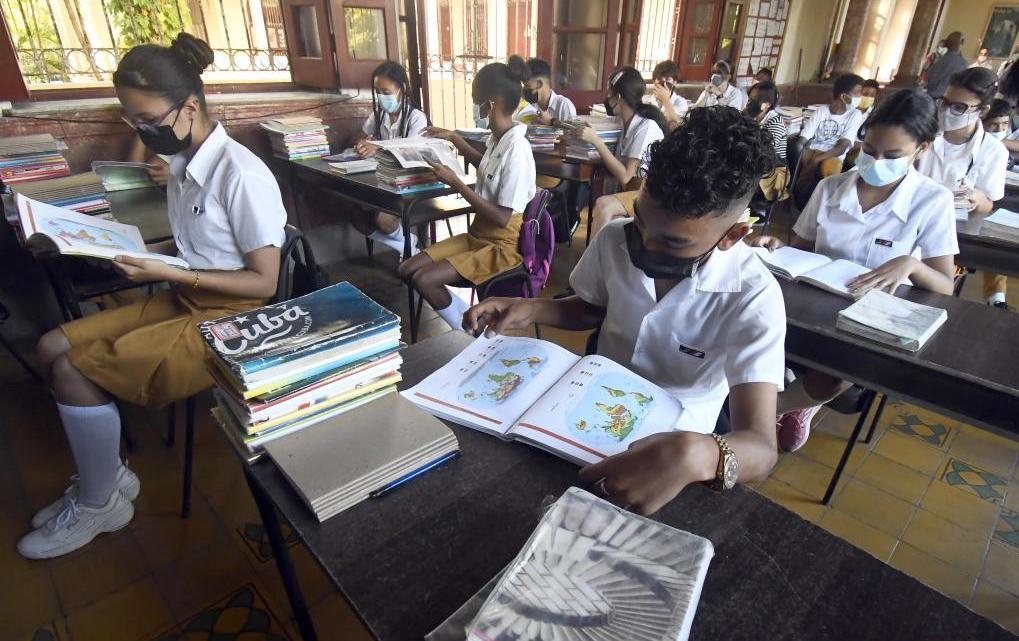"My son doesn't know anything about politics, let alone understand what's going on between Russia and Ukraine, at age 13, but at school they talk to him about it, and I'm worried about what they're teaching him," says Milagros, a mother from Holguin worried about the excessive ideologization in Cuban schools.
"As soon as the year began, they held a parents' meeting so that we would help them watch the Mesa Redonda (Round Table) and the Noticiero (News Broadcast), as they are required to know what is being said there. Otherwise, they will be left reviewing that 'content' after school," adds Milagros.
"It has always been like that, but now the emphasis on politics is much greater. And now they are focused on the war in Ukraine; they want the kids to learn that the culprit is the United States, that the United States forced Russia to invade that country."
"Most parents don't care, they don't see how serious the issue is, because they are uninformed, but not me. My brother lives in Spain and sends me news of what is happening. This is a crime and they want, as always, to blame it on the United States. It bothers me that they are brainwashing the children, and you can't do anything about it, because it's the school, and they impose it," she concluded, upset.
Indira, another mother with two children at school, does not think it is serious, as she believes that "what they study at school is not that important." In her view, for the children, "both mathematics and politics are just things that they're going to be evaluated on, they're not going to retain it after the exam. They?re not interested in politics, in any of those things they don?t see reflected in practice."
"I have two, one in eighth grade and the other in eleventh, and the only thing they talk about is going abroad, about leaving, about neighbors or friends who have left and communicate with them. They know that the future isn?t here or in those policies; although they try to ingrain it in them, it doesn't work," she adds, confident in the power of reality to overcome manipulation.
The Cuban educational system is characterized by its marked ideological component, but this has lost its effectiveness in recent decades, and the regime has been showing signs of concern for years.
This worry visibly increased after the July 11 protests. The regime responded, firstly, by inducing fear through the imprisonment of young people and adolescents detained for participating in the demonstrations. Second, it has intensified propaganda aimed at the young, something that Miguel Díaz-Canel has called "differentiated attention."
Propaganda in schools about Russia's war against Ukraine is, apparently, part of this worldview that the regime is striving to instill in the minds of young people.
Yoleisis Torres, from Holguín, is concerned that "political manipulation and indoctrination are part of the content in the classes" because he and his family, including his sixth-grade son, are Jehovah's Witnesses.
"We have to put up with such political content and, worst of all, distorted reality. We have our interpretation of the events of the war in Ukraine, and it's very different from what is cited on the news. But, out of caution I have told my son not to give his opinion at school because there you can only say 'it's America's fault.' It would be bad for him to refute that imposed view, even in religious matters. The atmosphere is very politicized. "
"We prepared our children to ignore that information, but without confrontation, without controversy, so that it doesn?t affect them in their scholastic or Christian development according to our precepts, but there are always risks, and they're vulnerable," he added. "There is peer pressure and the effect of the teacher's leadership in that environment. It's a challenge, but there's nothing else that can be done to avoid it."
The Cuban regime is one of the few governments in the world that has justified Russia's invasion of Ukraine, which began last February 24, violating the sovereignty of that European country and already producing thousands of deaths, 2.5 million refugees, and millions in material losses. The international community's condemnation of the act is almost unanimous, with the exception of dictatorships and authoritarian regimes such as Cuba, which abstained from voting at the UN on the subject.
The pro-government media is portraying Russia as a victim and accusing the United States of forcing Moscow to invade Ukraine.
